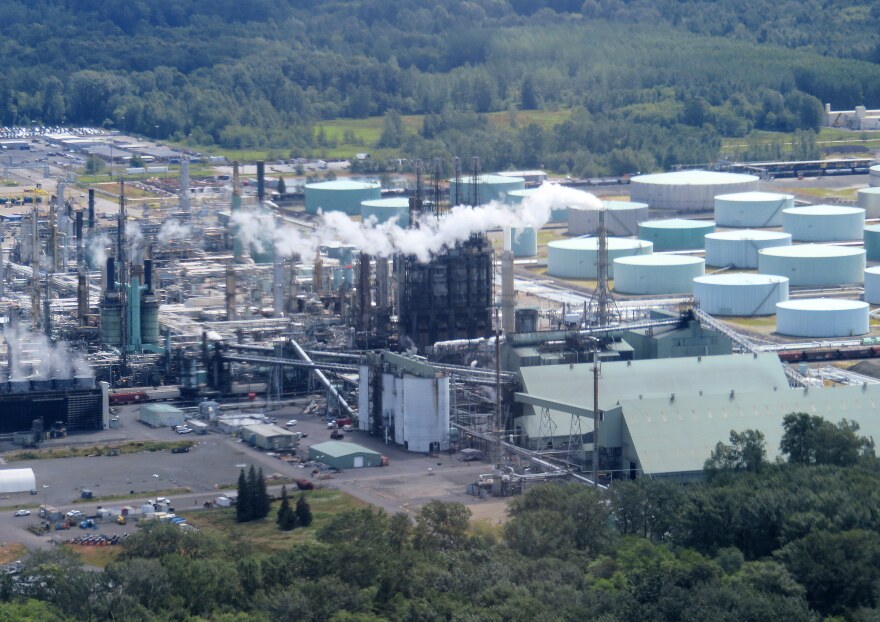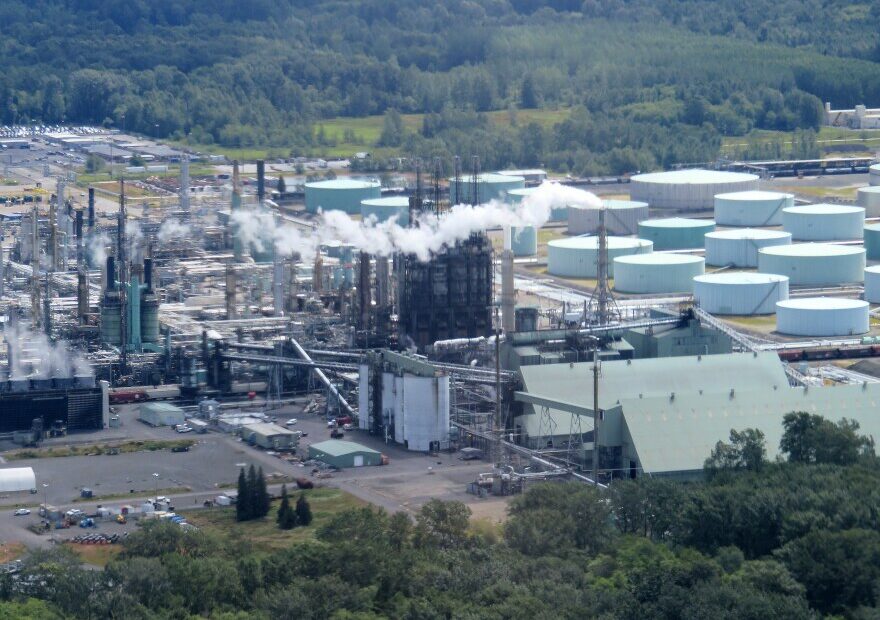
Washington State Legislators Propose Tax On Oregon Drivers’ Fuel
Read
Democrats in charge of the Washington Legislature are proposing a new tax on gasoline and diesel fuel destined for Oregon, Idaho and Alaska to partially pay for a cornucopia of highway, transit, rail, bike trail and ferry construction across Washington state. The “exported fuel tax” was included in a transportation spending and revenue package unveiled Tuesday in Olympia.
Washington state legislators have leverage due to the fact there is no oil production or refinery in Oregon or Idaho and just one small refinery in oil-rich Alaska. According to the U.S Energy Information Administration, more than 90 percent of the gasoline and diesel Oregon drivers use comes from refineries along Puget Sound.
“We bear the brunt for the environmental impacts that are created by having the refineries here in the state,” Washington House Transportation Committee Chair Jake Fey (D-Tacoma) said about the reasoning behind the new tax. “In terms of fairness, I think it is only appropriate since we produce the fuels for their use that they support our climate activities and our overall activities in the package.”
The proposed export fuel tax rate is 6 cents per gallon at the wholesale level and would take effect next February. Legislative staff estimated the new tax would bring in around $2 billion over the next 16 years, with the lion’s share of that coming from levies on gasoline and diesel delivered to Oregon.
Oregon state Sen. Lee Beyer, a Democrat and co-chair of the state’s Joint Transportation Committee, said Tuesday that he’d heard Washington was considering floating an export tax.
“I have questions about the constitutionality of the proposal,” Beyer said in a text message. “I suppose if enacted, Oregon will look at ways to retaliate.”
The Oregon Trucking Associations and Oregon Fuels Association, a gas station and distributors group, had similarly dubious initial reactions.
Beyer has worked extensively with Washington lawmakers over the years as the two states look to forge an agreement on a new bridge over the Columbia River on Interstate 5. Asked whether the tax proposal could sour that ongoing discussion, Beyer said: “I don’t want to jump to any conclusions on that.”
Washington Senate Transportation Committee Chair Marco Liias (D-Mukilteo) said there is precedent for a state to charge an exported fuel tax that targets a neighboring state’s drivers.
“Florida, Texas and Tennessee… have taxes that they apply to exported fuel from their in-state refineries,” Liias said during a virtual press conference Tuesday. “Washington will not be the first to consider this as a revenue tool.”
If approved by the full Washington State Legislature, the export tax would apply to vehicle fuels piped or shipped from Washington to any other U.S. state with a lower gas tax, which on a practical basis means it would largely fall on Oregonians and to a much lesser degree on northern Idaho and Alaskans. California receives gasoline by barge from Washington, but the Golden State’s drivers would be spared because they are already highly taxed.
For a change, there is no gas tax increase on Washington drivers in the multi-faceted transportation spending blueprint, but there are an assortment of license fee hikes. The total $16 billion, 16-year package also dips into the state operating budget surplus for $2 billion and deploys federal infrastructure money and future carbon emissions fees, including on Washington’s five major refineries. Republicans in the state Legislature said they were disappointed to be excluded from the closed-door meetings at which the package was assembled.
A state legislator from Vancouver, Washington, argued turnabout is fair play when it comes to the export fuel tax. Democratic state Rep. Sharon Wylie represents tens of thousands of commuters who live in Washington, but have Oregon taxes withheld from their paychecks because they work at jobs in the Portland area.
“My people pay 10 percent Oregon income tax if they don’t have a job on my side of the river,” Wylie said.
The single biggest highway construction project ticketed for funding in the proposed new transportation package is $1 billion for Washington’s share of the cost to replace the old and seismically-vulnerable I-5 bridges over the Columbia River between Portland and Vancouver. The spending blueprint also includes a contribution toward a better bridge over the Columbia at Hood River, Oregon. Legislative leaders in Olympia said there was no linkage between the export fuel tax and the sums dedicated to improved interstate bridges, which are fewer.
Legislative consideration of the full package, dubbed Move Ahead Washington by its drafters, begins Thursday in Liias’ committee. The 2022 session of the Washington Legislature is scheduled to wrap up by March 10.
Salem correspondent Dirk VanderHart contributed to this report.
Related Stories:
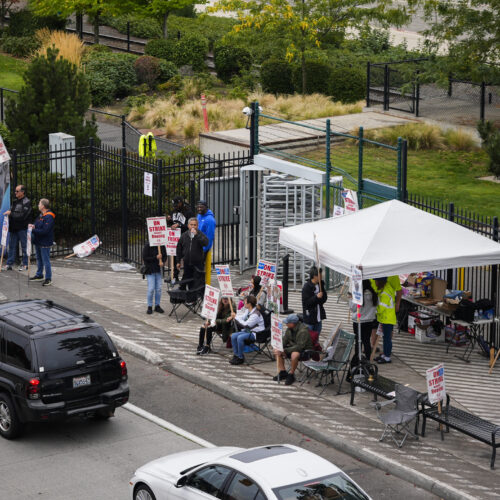
Striking workers in Washington could get access to unemployment claims if bill passes
A proposed bill that would give striking workers some access to the state’s unemployment benefits is getting closer to becoming law in Washington.
Majority lawmakers in the House Committee on Labor & Workplace Standards moved the bill out of committee on Friday, with a recommendation to pass it. This, after the bill narrowly passed the senate with 28 yeas and 21 nays earlier this month.
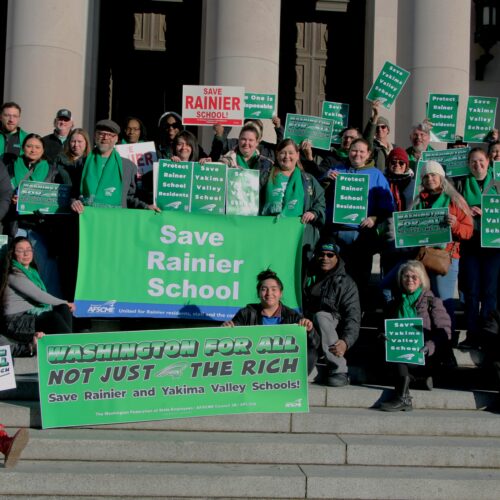
State considers closure of residential facilities for people with disabilities
Ever since he started working at Rainier School in Buckley, Washington, Willis McNabb has been hearing that the state was going to close it. This time, he said it feels more real.
“I’ve never been so worried as I am today,” McNabb said.
Since 1991, McNabb has worked at Rainier, which gives people with intellectual and developmental disabilities a place to find community, learn, work and receive comprehensive health treatment.
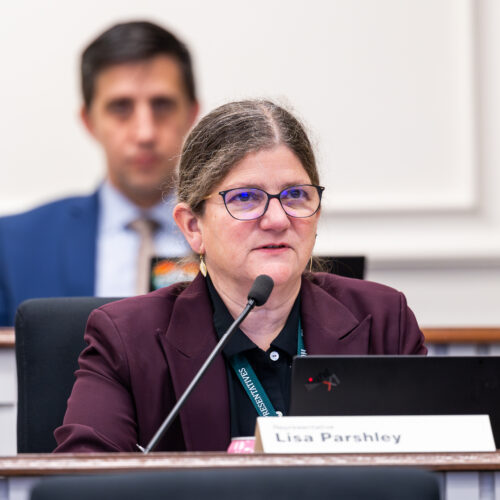
Washington bills attempt to give public workers power to bargain on AI
There are only so many things employees get to have a say over in their jobs. Which laptops or messaging app your office uses might not be your call.
For a while, decisions on the use of technology in the workplace have been up to management for public workers in Washington state, thanks to a law passed in 2002. But now, some lawmakers want to pass an exemption that would allow public sector employees to bargain on one broad and ever-changing technology — artificial intelligence.

